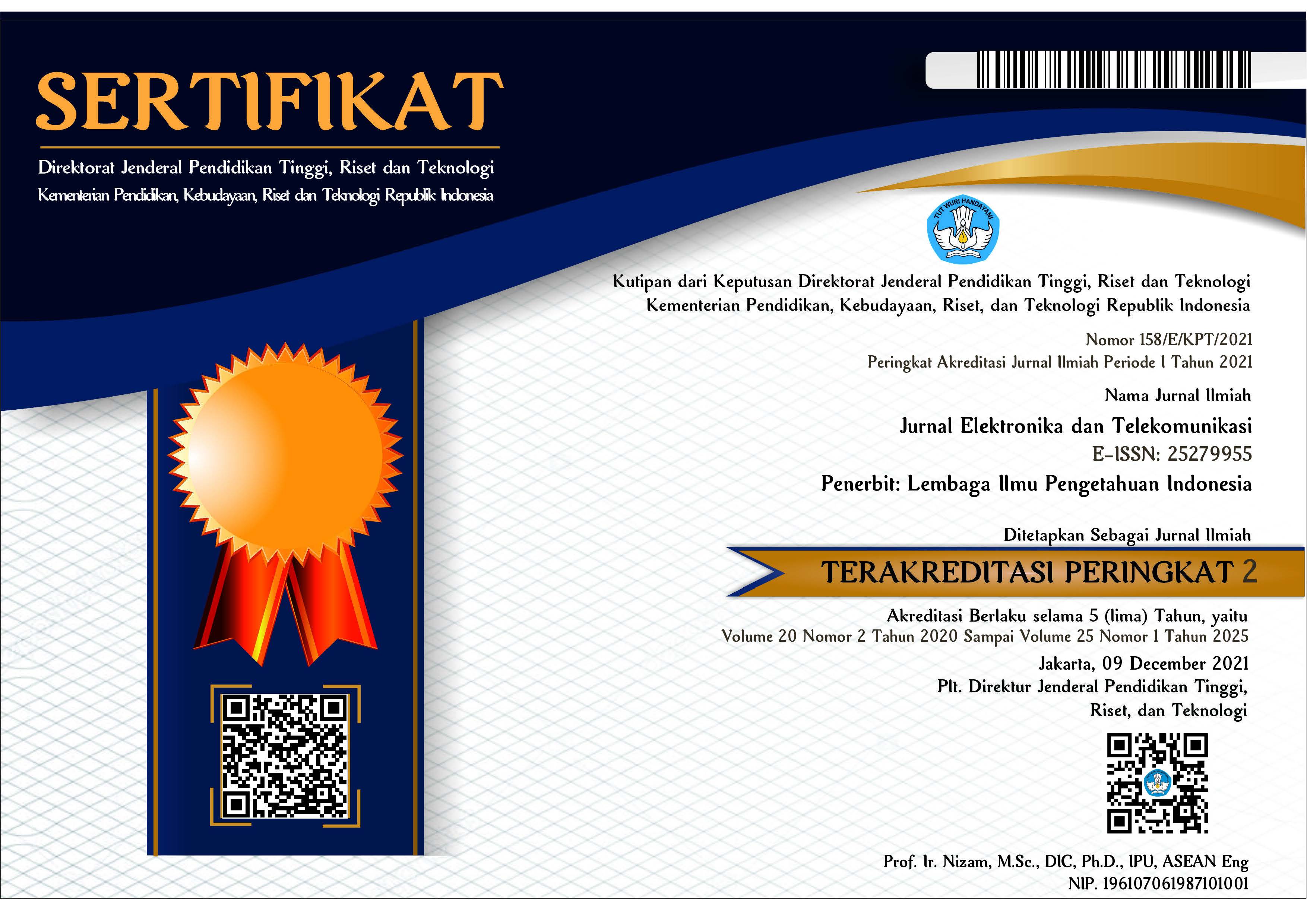Improving Neural Network Based on Seagull Optimization Algorithm for Controlling DC Motor
Abstract
This article presents a direct current (DC) motor control approach using a hybrid Seagull Optimization Algorithm (SOA) and Neural Network (NN) method. SOA method is a nature-inspired algorithm. DC motor speed control is very important to maintain the stability of motor operation. The SOA method is an algorithm that duplicates the life of the seagull in nature. Neural network algorithms will be improved using the SOA method. The neural network used in this study is a feed-forward neural network (FFNN). This research will focus on controlling DC motor speed. The efficacy of the proposed method is compared with the Proportional Integral Derivative (PID) method, the Feed Forward Neural Network (FFNN), and the Cascade Forward Backpropagation Neural Network (CFBNN). From the results of the study, the proposed control method has good capabilities compared to standard neural methods, namely FFNN and CFBNN. Integral Time Absolute Error and Square Error (ITAE and ITSE) values from the proposed method are on average of 0.96% and 0.2% better than the FFNN and CFBNN methods.
Keywords
References
A. Lotfy, M. Kaveh, M.R. Mosavi, and A.R. Rahmati, “An enhanced fuzzy controller based on improved genetic algorithm for speed control of DC motors”, Analog Integrated Circuits and Signal Processing, vol. 105, pp. 141-155, 2020. Crossref
M. Aamir, “On Replacing PID Controller with ANN Controller for DC Motor Position Control”, International Journal of Research Studies in Computing, Vol 2(1), pp. 21-29, 2013. Crossref
A.A. El-Samahy, and M.A. Shamseldin, “Brushless DC motor tracking control using self-tuning fuzzy PID control and model reference adaptive control”, Ain Shams Engineering Journal, Vol. 9, Issue 3, pp 341-352, 2018. Crossref
N. N. Baharudin and S. M. Ayob, “Brushless DC motor drive control using Single Input Fuzzy PI Controller (SIFPIC)”, 2015 IEEE Conference on Energy Conversion (CENCON), Johor Bahru, pp. 13-18, 2015. Crossref
B. N. Kommula and V. R. Kota, “Performance evaluation of Hybrid Fuzzy PI speed controller for Brushless DC motor for Electric vehicle application”, 2015 Conference on Power, Control, Communication and Computational Technologies for Sustainable Growth (PCCCTSG), Kurnool, pp. 266-270, 2015. Crossref
N. Tiwary, A. Rathinam and S. Ajitha, “Design of Hybrid Fuzzy-PI controller for speed control of Brushless DC motor”, International Conference on Electronics, Communication and Instrumentation (ICECI), Kolkata, pp. 1-4, 2014. Crossref
E. Flores-Morán, W. Yánez-Pazmiño and J. Barzola-Monteses, “Genetic algorithm and fuzzy self-tuning PID for DC motor position controllers”, 2018 19th International Carpathian Control Conference (ICCC), Szilvasvarad, pp. 162-168, 2018. Crossref
A. Y. Al-Maliki and K. Iqbal, “FLC-based PID controller tuning for sensorless speed control of DC motor”, 2018 IEEE International Conference on Industrial Technology (ICIT), Lyon, pp. 169-174, 2018. Crossref
R. Tudoroiu, M. Zaheeruddin, N. Tudoroiu and D. D. Burdescu, “Fuzzy Logic PID Control of a PMDCM Speed Connected to a 10-kW DC PV Array Microgrid—Case Study”, 2019 Federated Conference on Computer Science and Information Systems (FedCSIS), Leipzig, Germany, pp. 359-362, 2019. Crossref
B. M. Zaineb, A. Aicha, B. H. Mouna and S. Lassaad, “Speed control of DC motor based on an adaptive feed forward neural IMC controller”, 2017 International Conference on Green Energy Conversion Systems (GECS), Hammamet, pp. 1-7, 2017. Crossref
R. Jacob and S. Murugan, “Implementation of neural network based PID controller”, 2016 International Conference on Electrical, Electronics, and Optimization Techniques (ICEEOT), Chennai, pp. 2769-2771, 2016. Crossref
N. Pimkumwong and M. Wang, “An Online Artificial Neural Network Speed Estimator for Sensorless Speed Control of Separately Excited DC Motor”, 2018 15th International Conference on Electrical Engineering/Electronics, Computer, Telecommunications and Information Technology (ECTI-CON), Chiang Rai, Thailand, pp. 37-40, 2018. Crossref
R. Singh, A. Kumar and R. Sharma, “Fractional Order PID Control using Ant Colony Optimization”, 2016 IEEE 1st International Conference on Power Electronics, Intelligent Control and Energy Systems (ICPEICES), Delhi, pp. 1-6, 2016. Crossref
D. Sandoval, I. Soto and P. Adasme, “Control of direct current motor using Ant Colony optimization”, 2015 CHILEAN Conference on Electrical, Electronics Engineering, Information and Communication Technologies (CHILECON), Santiago, pp. 79-82, 2015. Crossref
E. C. Şimşek, A. Köse, M. Şahin and E. Irmak, “Optimization of PID Parameters Using Ant Colony Algorithm for Position Control of DC Motor”, 2019 8th International Conference on Renewable Energy Research and Applications (ICRERA), Brasov, Romania, pp. 1047-1051, 2019. Crossref
B. A. Kouassi, Y. Zhang, S. Ouattara and M. J. Mbyamm Kiki, “PID Tuning of Chopper Fed Speed Control of DC Motor Based on Ant Colony Optimization Algorithm”, 2019 IEEE 3rd International Electrical and Energy Conference (CIEEC), Beijing, China, pp. 407-412, 2019. Crossref
K. R. Das, D. Das and J. Das, “Optimal tuning of PID controller using GWO algorithm for speed control in DC motor”, 2015 International Conference on Soft Computing Techniques and Implementations (ICSCTI), Faridabad, pp. 108-112, 2015. Crossref
B. M. Kumar and R. B. Ashok, “Soft Computing Using GWO (Grey Wolf Optimization) for the Performance Improvement of High-Speed Brushless DC Motor”, 2018 International Conference on Emerging Trends and Innovations in Engineering and Technological Research (ICETIETR), Ernakulam, pp. 1-6, 2018. Crossref
A. Ahmed, R. Gupta and G. Parmar, “GWO/PID Approach for Optimal Control of DC Motor”, 2018 5th International Conference on Signal Processing and Integrated Networks (SPIN), Noida, pp. 181-186, 2018. Crossref
M. Muniraj, R. Arulmozhiyal, and D. Kesavan, “An Improved Self-tuning Control Mechanism for BLDC Motor Using Grey Wolf Optimization Algorithm,” International Conference on Communication, Computing and Electronics Systems, pp. 315–323, 2020. Crossref
H. K. Verma and C. Jain, "Big-bang big-crunch based optimization of PID controller for DC motor”, 2015 International Conference on Computer, Communication and Control (IC4), Indore, pp. 1-7, 2015. Crossref
D. Potnuru and A. S. L. V. Tummala, “Implementation of Grasshopper Optimization Algorithm for Controlling a BLDC Motor Drive,” Advances in Intelligent Systems and Computing, pp. 369–376, Aug. 2018. Crossref
B. Hekimoğlu, “Optimal Tuning of Fractional Order PID Controller for DC Motor Speed Control via Chaotic Atom Search Optimization Algorithm”, in IEEE Access, vol. 7, pp. 38100-38114, 2019. Crossref
S. Ekinci, B. Hekimoğlu, and D. Izci, “Opposition based Henry gas solubility optimization as a novel algorithm for PID control of DC motor,” Engineering Science and Technology, an International Journal, vol. 24, no. 2, pp. 331–342, Apr. 2021. Crossref
P. Khluabwannarat, A. Nawikavatan and D. Puangdownreong, “Application of Parallel Flower Pollination Algorithm to Fractional-Order Model Identification of BLDC Motor”, 2020 17th International Conference on Electrical Engineering/Electronics, Computer, Telecommunications and Information Technology (ECTI-CON), Phuket, Thailand, pp. 131-134, 2020. Crossref
D. Potnuru, K. Alice Mary, and C. Sai Babu, “Experimental implementation of Flower Pollination Algorithm for speed controller of a BLDC motor,” Ain Shams Engineering Journal, vol. 10, no. 2, pp. 287–295, Jun. 2019. Crossref
T. Tarczewski, L. J. Niewiara and L. M. Grzesiak, “An Application of Flower Pollination Algorithm to Auto-Tuning of Linear-Quadratic Regulator for DC-DC Power Converter”, 2018 20th European Conference on Power Electronics and Applications (EPE'18 ECCE Europe), Riga, pp. 1-8, 2018.
P. S. R. Nayak and T. A. Rufzal, “Flower Pollination Algorithm Based PI Controller Design for Induction Motor Scheme of Soft-Starting”, 2018 20th National Power Systems Conference (NPSC), Tiruchirappalli, India, pp. 1-6, 2018. Crossref
G. Dhiman and V. Kumar, “Seagull optimization algorithm: Theory and its applications for large-scale industrial engineering problems,” Knowledge-Based Systems, vol. 165, pp. 169–196, Feb. 2019. Crossref
W. Aribowo, S. Muslim, munoto, B. Suprianto, U. T. Kartini and I. G. P. Asto Buditjahjanto, “Tuning of Power System Stabilizer Using Cascade Forward Backpropagation”, 2020 Third International Conference on Vocational Education and Electrical Engineering (ICVEE), Surabaya, Indonesia, pp. 1-5, 2020. Crossref
B. A. Obaid, A. L. Saleh, and A. K. Kadhim, “Resolving of optimal fractional PID controller for DC motor drive based on anti-windup by invasive weed optimization technique,” Indonesian Journal of Electrical Engineering and Computer Science, vol. 15, no. 1, p. 95, Jul. 2019. Crossref
W. Aribowo, B. Suprianto, and Joko "Improving neural network using a sine tree-seed algorithm for tuning motor DC", International Journal of Power Electronics and Drive System (IJPEDS), vol. 12, no. 2, pp. 1196-1204, 2021. Crossref
Article Metrics
Metrics powered by PLOS ALM
Refbacks
- There are currently no refbacks.
Copyright (c) 2021 National Research and Innovation Agency

This work is licensed under a Creative Commons Attribution-NonCommercial-ShareAlike 4.0 International License.
























